Jun 22, 2018 | Non categorizzato
http://vimeo.com/69074558 «The secret of true love is this, the secret lies in this: that the love we speak of is what is truly understood by the Gospel. The Gospel is the good news that Christ brought on earth, so it’s a love as it is conceived in God, not on earth. It’s a love that we see being lived by the persons of the Most Holy Trinity. For example, the Father loves everyone and lets the rain fall and makes the sun rise on the good and on the bad, he loves everyone. So it’s a love that puts us in the disposition to love all our brothers and sisters, so not only our relatives, friends or the ones we like, but we have to love everyone. Therefore, during the day, in order to love them, we have to single out every person we meet. A second requirement of this love, which does not exist on earth precisely because it comes from Heaven, is that we must be the first to love and not wait to be loved. Generally, one waits to be loved in order to love. Instead it must be like this: we must be the first to love and this is shown by Jesus, the second divine Person who became man, who died for us when we were yet sinners, which means that we certainly were not loving then. It’s a tangible love, like that of Jesus, who gave his life. It’s not a sentimental, platonic love, but one that becomes real. It’s a love that “makes itself one” with the other, with those who suffer and those who rejoice, and participate in the suffering and helps those who suffer or participates in the joy. If this love is practiced in the world, and the Movement lives it, … it’s the secret of the Movement. The Movement has lived it in all the nations of the world. Generally it has been reciprocated because people feel loved and get along well with us. So they ask us, “But why?” And we explain why we love. So a dialogue between us and others begins, and they are not all Christians, not all Catholic, but many times belonging to other religions, even non-believers. But even non-believers, in their DNA, have the idea of loving and the strength to love because they are created by God who is Love. This is something about love». Chiara Lubich Translation of an interview given by Erik Hendriks, Sylvester Production, May 24, 2004, for Belgian TV. www.centrochiaralubich.org
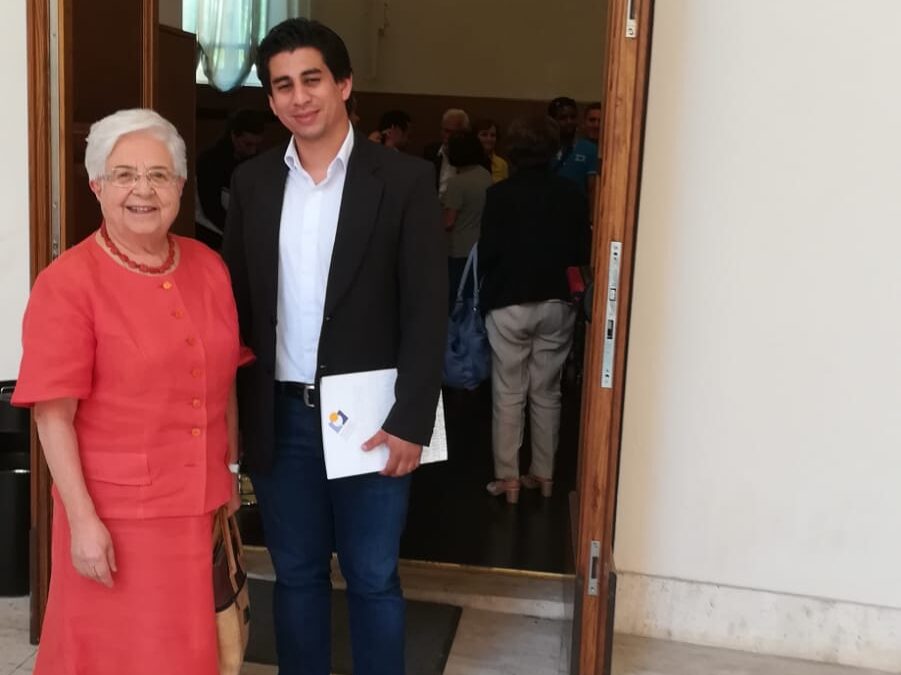
Jun 21, 2018 | Non categorizzato
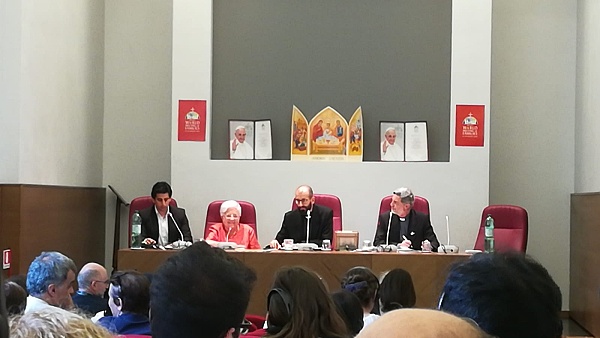 Organized by the Catholic Church’s Dicastery for Laity, Family and Life, the meeting coincided with the publication of the “Instrumentum laboris” of the next Synod of Catholic Bishops in October, which is dedicated to youth. This thought-provoking document includes the input of young people from around the world.. Kevin Farrell, the Dicastery’s Cardinal Prefect introduced the meeting. Msgr Carlos Simón Vázquez, delegate for the Family and Life section presented the latest developments concerning the IX World Meeting of Families which will be celebrated in Dublin from 21 to 26 August. Fr Alexandre Awi Mello, the Dicastery’s Secretary reported on the preparations for next October’s Synod of Bishops. Giovanna Guerrieri Nalin, of the Youth Office spoke about the next World Youth Day, scheduled to be held in Panama in January 2019. In the afternoon, the General Secretary of the Synod of Bishops, Cardinal Lorenzo Baldisseri, presented the aims, the expectations, and the prospects of the upcoming Synod.
Organized by the Catholic Church’s Dicastery for Laity, Family and Life, the meeting coincided with the publication of the “Instrumentum laboris” of the next Synod of Catholic Bishops in October, which is dedicated to youth. This thought-provoking document includes the input of young people from around the world.. Kevin Farrell, the Dicastery’s Cardinal Prefect introduced the meeting. Msgr Carlos Simón Vázquez, delegate for the Family and Life section presented the latest developments concerning the IX World Meeting of Families which will be celebrated in Dublin from 21 to 26 August. Fr Alexandre Awi Mello, the Dicastery’s Secretary reported on the preparations for next October’s Synod of Bishops. Giovanna Guerrieri Nalin, of the Youth Office spoke about the next World Youth Day, scheduled to be held in Panama in January 2019. In the afternoon, the General Secretary of the Synod of Bishops, Cardinal Lorenzo Baldisseri, presented the aims, the expectations, and the prospects of the upcoming Synod. 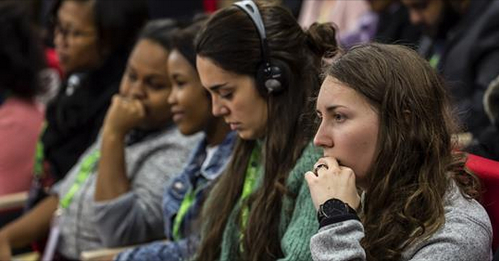 The contribution of the Focolare Movement The Focolare Movement was among the participants, represented by a young person from Salvador, Nelson Vanegas and Focolare President Maria Voce, who reflected on how “apostolic initiatives directed towards young people in the areas of announcing the faith and of vocation, can be rooted in the characteristic experience born from the charism of unity”. Back in the 1960s young people turned to Chiara as she called for a new type of revolution, inspired by Gospel love (“Youth of the world unite!”). This has led to the development of new ways and centres of formation and witness, shaped together with the young people themselves. These cover areas such as the gift that the young and older can be for one another, the link between life and thought, the living out of fraternity to respond to the challenges and problems of today’s world.
The contribution of the Focolare Movement The Focolare Movement was among the participants, represented by a young person from Salvador, Nelson Vanegas and Focolare President Maria Voce, who reflected on how “apostolic initiatives directed towards young people in the areas of announcing the faith and of vocation, can be rooted in the characteristic experience born from the charism of unity”. Back in the 1960s young people turned to Chiara as she called for a new type of revolution, inspired by Gospel love (“Youth of the world unite!”). This has led to the development of new ways and centres of formation and witness, shaped together with the young people themselves. These cover areas such as the gift that the young and older can be for one another, the link between life and thought, the living out of fraternity to respond to the challenges and problems of today’s world. 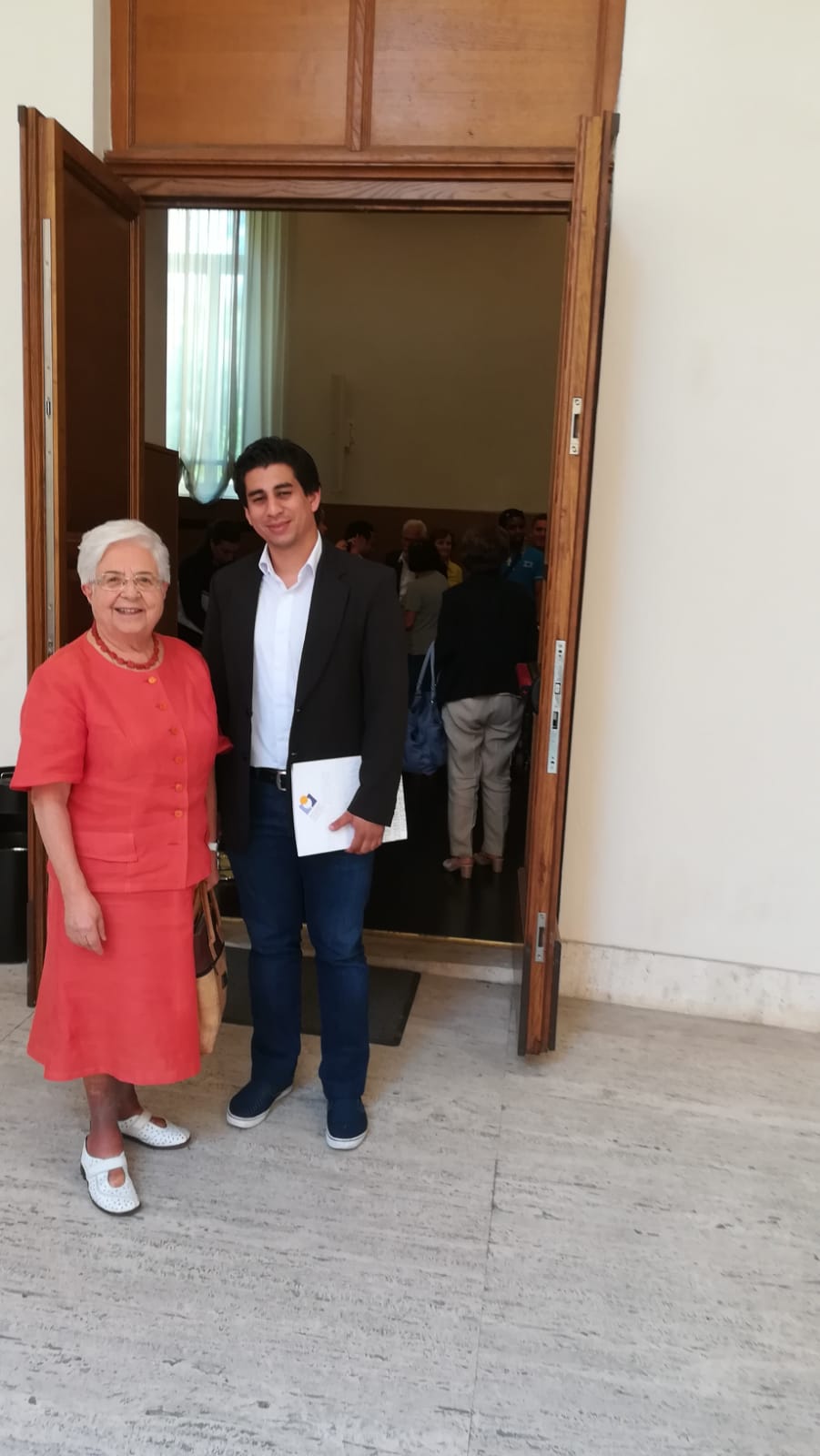 Nelson had participated in the presynodal meeting in March. He presented the Focolare’s youth-focused activity. “In annual summer schools of formation for young people, we cover theological and moral formation. This involves a style of accompanying the young which is in tune with Pope Francis’ suggestions. Schools of vocational discernment offer a real pathway for young people aged between 23 and 30 years, a crucial age, to face up to making definitive choices for their personal life plan”. There are also opportunities for young people to experience the link between life and study. He explained how “the University Institute of Sophia, based in Loppiano (near Florence, Italy), aims to enable the interaction of areas of knowledge through an academic project centred on the experience of a studying community. Research, ideas and life are shared not only between students from different countries and backgrounds, but also between students and academics”. Other opportunities for youth formation are offered in national and international congresses and “schools” for the Gen (the young generations of the Focolare Movement). Finally, Nelson announced the Genfest. “It is a formative experience, based on a widespread ongoing commitment to inclusion, welcoming and listening to others, which leads to true dialogue and to the construction of deep relationships. A Genfest is above all a profound spiritual experience, through which in past years, many young people have heard or reheard the call of God, to live for something great, to fulfill the last prayer and dream of Jesus”. The next Genfest is almost here: in Manila, the Philippines, 6-8 July, with the title “Beyond all borders”.
Nelson had participated in the presynodal meeting in March. He presented the Focolare’s youth-focused activity. “In annual summer schools of formation for young people, we cover theological and moral formation. This involves a style of accompanying the young which is in tune with Pope Francis’ suggestions. Schools of vocational discernment offer a real pathway for young people aged between 23 and 30 years, a crucial age, to face up to making definitive choices for their personal life plan”. There are also opportunities for young people to experience the link between life and study. He explained how “the University Institute of Sophia, based in Loppiano (near Florence, Italy), aims to enable the interaction of areas of knowledge through an academic project centred on the experience of a studying community. Research, ideas and life are shared not only between students from different countries and backgrounds, but also between students and academics”. Other opportunities for youth formation are offered in national and international congresses and “schools” for the Gen (the young generations of the Focolare Movement). Finally, Nelson announced the Genfest. “It is a formative experience, based on a widespread ongoing commitment to inclusion, welcoming and listening to others, which leads to true dialogue and to the construction of deep relationships. A Genfest is above all a profound spiritual experience, through which in past years, many young people have heard or reheard the call of God, to live for something great, to fulfill the last prayer and dream of Jesus”. The next Genfest is almost here: in Manila, the Philippines, 6-8 July, with the title “Beyond all borders”.
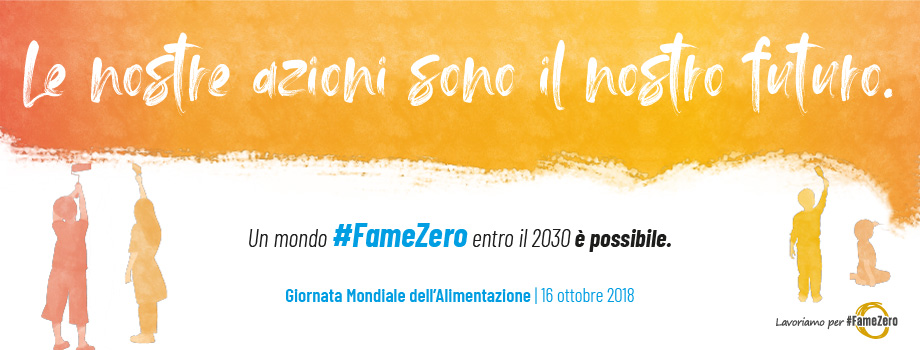
Jun 19, 2018 | Non categorizzato
 The adolescents and youths can become the first generation to succeed in uprooting hunger in the world. This is stated in the 17 Sustainable Development Goals (SDG), approved on 25 September 2015 by the 193 Member States of the UN, with the commitment to achieve them in 15 years (2015-2030). The second objective, “Zero Hunger,” is the core of this programme. To be able to reach it, the UN’s Food and Agriculture Organisation (FAO) places its bet on the new generations. The boys and girls of the Focolare Movement have decided to make this the key theme of their annual training congress, from 20 to 24 June. While 630 girls will meet at the International Mariapolis Centre in Castel Gandolfo, 250 boys will hold their meetings in the international town of Loppiano (Florence). The participants shall come from various countries of Europe and South America. In Loppiano, the 250 boys will deepen the “Zero Hunger” theme and try to see how to actualise it in daily life, rediscovering values like courage, forgiveness, service, endeavour, spirituality, responsibility, loyalty, and acknowledgment of the capacities of others. The girls instead shall live a special day on 22 June, when they will visit the international headquarters of the FAO in the centre of Rome, to participate in the discussion on the “Zero Hunger” goal. At the end of the session, they will receive the “Zero Hunger Citizens” passport. Replay the streaming on 22 June 2018, at 11 am (Rome). Lorenzo Russo
The adolescents and youths can become the first generation to succeed in uprooting hunger in the world. This is stated in the 17 Sustainable Development Goals (SDG), approved on 25 September 2015 by the 193 Member States of the UN, with the commitment to achieve them in 15 years (2015-2030). The second objective, “Zero Hunger,” is the core of this programme. To be able to reach it, the UN’s Food and Agriculture Organisation (FAO) places its bet on the new generations. The boys and girls of the Focolare Movement have decided to make this the key theme of their annual training congress, from 20 to 24 June. While 630 girls will meet at the International Mariapolis Centre in Castel Gandolfo, 250 boys will hold their meetings in the international town of Loppiano (Florence). The participants shall come from various countries of Europe and South America. In Loppiano, the 250 boys will deepen the “Zero Hunger” theme and try to see how to actualise it in daily life, rediscovering values like courage, forgiveness, service, endeavour, spirituality, responsibility, loyalty, and acknowledgment of the capacities of others. The girls instead shall live a special day on 22 June, when they will visit the international headquarters of the FAO in the centre of Rome, to participate in the discussion on the “Zero Hunger” goal. At the end of the session, they will receive the “Zero Hunger Citizens” passport. Replay the streaming on 22 June 2018, at 11 am (Rome). Lorenzo Russo
Jun 19, 2018 | Non categorizzato
World Refugee Day will be celebrated on June 20th at the behest of the UN General Assembly to highten awareness of the conditions of millions of refugees seeking asylum, as they flee war and violence in their own countries. The UN Agency for Refugees has launched the “#With Refugees” campaign, to give visibility to the gestures of solidarity towards refugees, giving voice to those who welcome and strengthen the encounter between local communitites and asylum seekers. But “#With Refugees” is also an appeal, by the UN’s High Commissioner for Refugees (UNHCR) that calls upon governments to ensure that every refugee child receives an education, that every refugee family has a safe place to live, and that every refugee can have access to a job or acquire new skills that will allow them to contribute to the community. The petition will be presented to the UN Assembly in 2018 at the adoption of the Global Compact for refugees. “Today,” says Carlotta Sami, spokesperson for the UNHCR for South Europe, “being on the side of the refugees is not only a humanitarian act; unfortunately, it is an act of bravery. It has become uncomfortable to be on the side of those who have chosen to leave their own countries and face a very heavy challenge – tha of starting again from zero in a new environment, often indifferent and, in the worst cases, hostile.” There have been numerous events at the end of this month. See: www.unhcr.org/withrefugees
Jun 18, 2018 | Non categorizzato
The first eruptions of the Fuego Volcano on 3rd June were so violent that many inhabitants of the villages along its slopes did not have time to escape. The eruptions continued for days after, causing fast moving currents of mud, rubble and burning embers called “Lahar”, which descended from the volcano, covering and destroying all that lay in its path. It also provoked earth disturbances that felt like earthquakes. The National Coordination for Disaster Reduction, CONRED, confirmed a state of alert in three districts, providing updates on the numbers of displaced people and coordinating the generous offers of emergency accommodation by hostels and hotels in the vicinity. Lourdes Barrientos is part of the CONRED team. She explained, «One of my responsibilities is to train and organize communities to respond to emergencies and natural disasters. Here we are in an emergency with so much suffering, loss of life and property in many families living near the volcano, especially in the communities of Chimaltenango, Escuintila e Sacatepéquez». These districts remain on red alert. As the number of people known to have died increases inexorably, the support response is coordinated from the CONRED headquarters in Guatemala City. «I have to go beyond my exhaustion to complete all the different tasks assigned to me. At first I did not find it straight forward, because it felt like I was wasting time staying in the headquarters instead of helping the victims, my people, directly. My job, in fact, was to collect and collate as much information as possible from the stricken communities, to facilitate the response of the institutions who had to face all these huge problems. It really got me down. My companions were active in the front line in places hit by the 3rd June eruptions, searching for bodies and helping the survivors. I knew how exhausted they were getting. I knew they were busy organizing emergency accommodation in the locality, while I was sitting in an office. At the same time, I was receiving endless messages from friends and well-wishers, from my family and Focolare friends, all asking if I was OK and if I was in the volcano zone. Suddenly I understood that wherever I was working, the important thing was to give all of myself, trying never to lose patience despite the nervous and physical exhaustion we were all experiencing. We are all in the front line. I can offer all I’m doing for my companions who are out there, in particular for one who died during the rescue operation. Requests for information about the victims keep pouring in. There’s so much suffering and such great need. Many people are offering help, many hotels have opened their doors. The love of many people is arriving in practical ways. This is what gives us the strength to carry on».
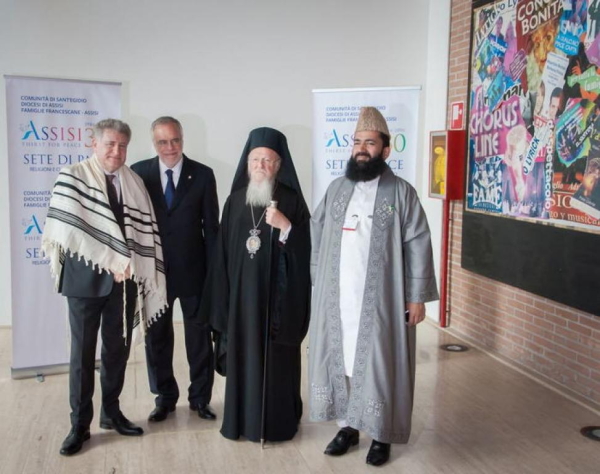
Jun 18, 2018 | Non categorizzato

Foto: www.santegidio.org


 Organized by the Catholic Church’s Dicastery for Laity, Family and Life, the meeting coincided with the publication of the “Instrumentum laboris” of the next Synod of Catholic Bishops in October, which is dedicated to youth. This thought-provoking document includes the input of young people from around the world.. Kevin Farrell, the Dicastery’s Cardinal Prefect introduced the meeting. Msgr Carlos Simón Vázquez, delegate for the Family and Life section presented the latest developments concerning the IX World Meeting of Families which will be celebrated in Dublin from 21 to 26 August. Fr Alexandre Awi Mello, the Dicastery’s Secretary reported on the preparations for next October’s Synod of Bishops. Giovanna Guerrieri Nalin, of the Youth Office spoke about the next World Youth Day, scheduled to be held in Panama in January 2019. In the afternoon, the General Secretary of the Synod of Bishops, Cardinal Lorenzo Baldisseri, presented the aims, the expectations, and the prospects of the upcoming Synod.
Organized by the Catholic Church’s Dicastery for Laity, Family and Life, the meeting coincided with the publication of the “Instrumentum laboris” of the next Synod of Catholic Bishops in October, which is dedicated to youth. This thought-provoking document includes the input of young people from around the world.. Kevin Farrell, the Dicastery’s Cardinal Prefect introduced the meeting. Msgr Carlos Simón Vázquez, delegate for the Family and Life section presented the latest developments concerning the IX World Meeting of Families which will be celebrated in Dublin from 21 to 26 August. Fr Alexandre Awi Mello, the Dicastery’s Secretary reported on the preparations for next October’s Synod of Bishops. Giovanna Guerrieri Nalin, of the Youth Office spoke about the next World Youth Day, scheduled to be held in Panama in January 2019. In the afternoon, the General Secretary of the Synod of Bishops, Cardinal Lorenzo Baldisseri, presented the aims, the expectations, and the prospects of the upcoming Synod.  The contribution of the Focolare Movement The Focolare Movement was among the participants, represented by a young person from Salvador, Nelson Vanegas and Focolare President Maria Voce, who reflected on how “apostolic initiatives directed towards young people in the areas of announcing the faith and of vocation, can be rooted in the characteristic experience born from the charism of unity”. Back in the 1960s young people turned to Chiara as she called for a new type of revolution, inspired by Gospel love (“Youth of the world unite!”). This has led to the development of new ways and centres of formation and witness, shaped together with the young people themselves. These cover areas such as the gift that the young and older can be for one another, the link between life and thought, the living out of fraternity to respond to the challenges and problems of today’s world.
The contribution of the Focolare Movement The Focolare Movement was among the participants, represented by a young person from Salvador, Nelson Vanegas and Focolare President Maria Voce, who reflected on how “apostolic initiatives directed towards young people in the areas of announcing the faith and of vocation, can be rooted in the characteristic experience born from the charism of unity”. Back in the 1960s young people turned to Chiara as she called for a new type of revolution, inspired by Gospel love (“Youth of the world unite!”). This has led to the development of new ways and centres of formation and witness, shaped together with the young people themselves. These cover areas such as the gift that the young and older can be for one another, the link between life and thought, the living out of fraternity to respond to the challenges and problems of today’s world.  Nelson had participated in the presynodal meeting in March. He presented the Focolare’s youth-focused activity. “In annual summer schools of formation for young people, we cover theological and moral formation. This involves a style of accompanying the young which is in tune with Pope Francis’ suggestions. Schools of vocational discernment offer a real pathway for young people aged between 23 and 30 years, a crucial age, to face up to making definitive choices for their personal life plan”. There are also opportunities for young people to experience the link between life and study. He explained how “the University Institute of Sophia, based in Loppiano (near Florence, Italy), aims to enable the interaction of areas of knowledge through an academic project centred on the experience of a studying community. Research, ideas and life are shared not only between students from different countries and backgrounds, but also between students and academics”. Other opportunities for youth formation are offered in national and international congresses and “schools” for the Gen (the young generations of the Focolare Movement). Finally, Nelson announced the Genfest. “It is a formative experience, based on a widespread ongoing commitment to inclusion, welcoming and listening to others, which leads to true dialogue and to the construction of deep relationships. A Genfest is above all a profound spiritual experience, through which in past years, many young people have heard or reheard the call of God, to live for something great, to fulfill the last prayer and dream of Jesus”. The next Genfest is almost here: in Manila, the Philippines, 6-8 July, with the title “Beyond all borders”.
Nelson had participated in the presynodal meeting in March. He presented the Focolare’s youth-focused activity. “In annual summer schools of formation for young people, we cover theological and moral formation. This involves a style of accompanying the young which is in tune with Pope Francis’ suggestions. Schools of vocational discernment offer a real pathway for young people aged between 23 and 30 years, a crucial age, to face up to making definitive choices for their personal life plan”. There are also opportunities for young people to experience the link between life and study. He explained how “the University Institute of Sophia, based in Loppiano (near Florence, Italy), aims to enable the interaction of areas of knowledge through an academic project centred on the experience of a studying community. Research, ideas and life are shared not only between students from different countries and backgrounds, but also between students and academics”. Other opportunities for youth formation are offered in national and international congresses and “schools” for the Gen (the young generations of the Focolare Movement). Finally, Nelson announced the Genfest. “It is a formative experience, based on a widespread ongoing commitment to inclusion, welcoming and listening to others, which leads to true dialogue and to the construction of deep relationships. A Genfest is above all a profound spiritual experience, through which in past years, many young people have heard or reheard the call of God, to live for something great, to fulfill the last prayer and dream of Jesus”. The next Genfest is almost here: in Manila, the Philippines, 6-8 July, with the title “Beyond all borders”.
